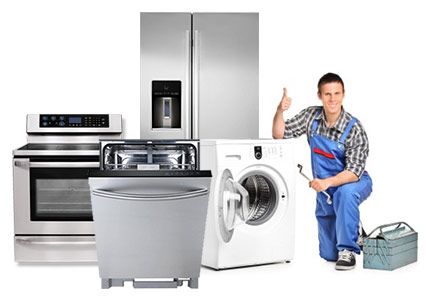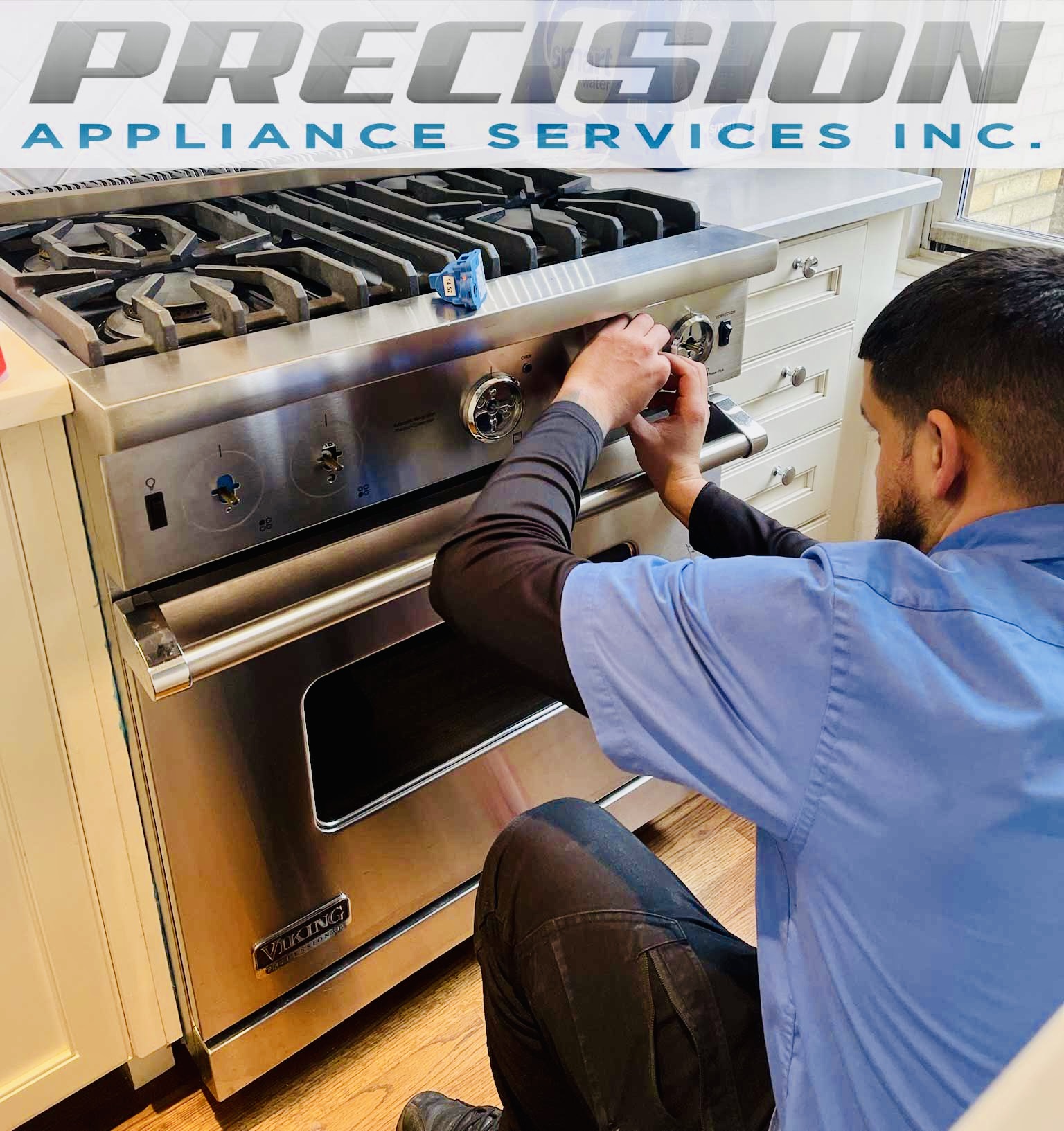The Ultimate Guide to Comprehending Appliance Repair Work in your home
When your fridge stops cooling down or your oven declines to warmth, it can feel overwhelming. Recognizing device repair work in your home can conserve you money and time. You'll learn to identify signs and symptoms, use necessary devices, and follow an organized troubleshooting procedure. However before you begin, there are crucial safety and security precautions you need to think about. What are one of the most usual troubles, and how can you fix them? Allow's check out the fundamentals.
Typical Home Appliance Problems and Their Symptoms
When your appliances start acting up, it's necessary to recognize the indicators at an early stage. Disregarding them can result in bigger problems and expensive repair services. If your refrigerator isn't cooling down appropriately, you might notice cozy areas or condensation forming. This can suggest a failing compressor or an obstructed vent.Your dishwashing machine might show issues via unclean meals or unusual noises throughout cycles. If you hear grinding or clanking, it's time to investigate.A cleaning maker that won't spin or drain pipes can leave you with soggy washing, suggesting a blocked drainpipe or a malfunctioning pump.Lastly, if your oven's temperature level seems off or it takes for life to preheat, you may be taking care of a defective thermostat. By remaining alert to these signs and symptoms, you can attend to concerns before they rise into significant repair work.
Essential Devices for Appliance Repair Service
When you're tackling appliance repairs at home, having the right tools is important. Fundamental hand devices like screwdrivers and pliers will certainly assist you take apart and take care of different home appliances, while electrical testing devices guarantee you're working securely with circuitry. Allow's look at what you require to get started on your repair work journey.
Basic Hand Tools
Having the right devices is crucial for reliable device repair at home. Begin with a trustworthy screwdriver collection, consisting of both flathead and Phillips kinds, as screws are usual in home appliance assembly. Pliers are also vital; they aid with gripping, twisting, and cutting wires or little components. A pair of needle-nose pliers can get to difficult situations conveniently. You'll require a great adjustable wrench for tightening up or loosening nuts and screws. An energy knife comes in handy for puncturing packaging or insulation. Lastly, don't neglect a durable workbench or surface to securely organize your devices and parts. With these basic hand devices, you'll be well-prepared to tackle most device repair services that come your way.
Electric Testing Tools
Alongside standard hand tools, electric screening gadgets play a necessary role in appliance fixing. These tools assist you diagnose electrical concerns and assurance devices function securely. A multimeter is vital; it determines voltage, current, and resistance, enabling you to pinpoint problems swiftly. A non-contact voltage tester is another essential, letting you spot real-time cords without making direct contact, boosting your safety. Secure meters are terrific for gauging existing flow in cables without separating them, conserving you effort and time. Furthermore, circuit testers can rapidly inspect if electrical outlets are functioning appropriately. By utilizing these gadgets, you'll simplify your troubleshooting process and improve your repair service abilities, making device upkeep a lot simpler.
Step-by-Step Guide to Diagnosing Home Appliance Issues
When your home appliance breaks down, it can be frustrating, however identifying the problem doesn't have to be overwhelming. You'll discover to determine typical issues and apply efficient fixing methods. Allow's go through the actions to obtain your device back in functioning order.
Usual Device Problems

Troubleshooting Techniques Explained

Repairing Significant Kitchen Home Appliances: A Closer Look
Have you ever questioned just how to tackle typical problems with your kitchen area home appliances? Fixing significant kitchen area devices like fridges, stoves, and dishwashing machines can be simpler than you think. Beginning by identifying the problem-- whether it's a fridge not cooling down or a stove that will not heat up. Often, a basic reset or examining the power source can fix the issue.For fridges, tidy the condenser coils and examine the door seals. If your stove's not home heating, inspect the burner and thermostat. Dishwashing machines may just require a tidy filter or a reset to obtain them back at work. Constantly disconnect the device prior to diving right into repair services to ensure your safety.Don' t forget to speak with important link the individual handbook for particular fixing suggestions connected to your design. With a little perseverance and the right tools, you can with confidence tackle device repair work and conserve money at the same time!

Fixing Washing Devices: Tips and Techniques
When your laundry home appliances begin acting up, it can really feel frustrating, but fixing them does not need to be a trouble. Start by examining the power supply. Confirm the home appliance is connected in and the outlet is functioning. Next, examine the door or lid switch; a faulty switch can avoid the machine from operating.For washers, if it's not spinning, inspect for unbalanced loads. Redistributing the clothing may solve the concern. If your clothes dryer isn't home heating, clean the lint filter and check the vent for blockages.Listen for uncommon sounds; they can show an issue. If your device is leaking, inspect the hose pipes for fractures or loose links. Record any type of error codes displayed on digital displays, as they can direct you in identifying the concern. Seek advice from the user guidebook for particular fixing suggestions connected to your model.
Security Precautions to Take During Repair works
Before you start any type of home appliance fixings, it's important to focus on safety to stop accidents or injuries. Unplug the home appliance or transform off the circuit breaker to ensure no power reaches it while you work. Usage insulated devices to decrease the threat of electrical shock. Use safety goggles and gloves to shield on your own from sharp edges or debris (Dependable Refrigeration & Appliance Repair Service Dryer repair near me).Make specific your office is tidy and well-lit, so you can see what you're doing. Maintain kids and animals far from the area to avoid interruptions and possible risks. If you're managing gas appliances, be additional cautious; check for leaks before proceeding.Take your time, and do not hurry via fixings. If you feel unclear about any type of step, it's far better to stop briefly and study than to guess. Adhering to these preventative measures will certainly assist like this produce a much safer environment for your DIY appliance fixing task
When to Call an Expert for Aid
Just how do you understand if it's time to employ a specialist for home appliance repairs? If you've tried basic troubleshooting without success, it's a clear indicator. If your device still will not start or reveals unusual sounds after resetting it, don't think twice to look for specialist help.When you discover leakages, smoke, or burning scents, focus on safety and call a pro right away. These issues can bring about even more substantial damages or posture threats to your home.Also, if your appliance is under guarantee, calling an expert is typically the best path. They can assure that repair services will not void your guarantee, conserving you money in the lengthy run.Finally, if you're unclear or uneasy with complicated fixings, it's smart to leave it to the professionals. Remember, taking on challenging concerns without the appropriate competence can cause costly errors. Depend on a professional when doubtful!
Frequently Asked Questions
How Can I Stop Appliance Problems in the Future?
To avoid home appliance troubles in the future, you must carry out ge oven igniter replacement normal maintenance, look for wear and tear, tidy filters, and stay clear of overloading. Remaining positive will certainly aid expand their life-span and maintain them running efficiently.
What Are the A Lot Of Usual Do It Yourself Home Appliance Repair Mistakes?
You might forget safety and security preventative measures, skip fixing steps, or use inaccurate tools when trying DIY home appliance repair work. Rushing the process or disregarding manufacturer guidelines can lead to more considerable problems and costly blunders. Keep patient and educated!
How Do I Know if a Part Demands Replacement?
You can inform if a part requires substitute by looking for unusual sounds, leakages, or inconsistent performance. If the appliance has a hard time to operate appropriately or reveals visible damages, it's likely time for a substitute.
Can I Use Generic Components for Home Appliance Repairs?
Yes, you can utilize generic parts for appliance fixings, yet ascertain they're suitable - Dependable Refrigeration & Appliance Repair Service Dryer repair near me. Generic components could save you cash, yet they can impact performance or durability, so evaluate your options carefully prior to making a choice
What Guarantees Cover Appliance Services?
Most device service warranties cover repair work for producing problems, yet they typically leave out damages from abuse. Check your service warranty terms thoroughly, as some may need utilizing qualified technicians and original parts for coverage to remain valid.